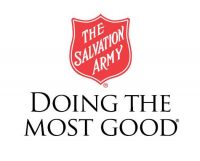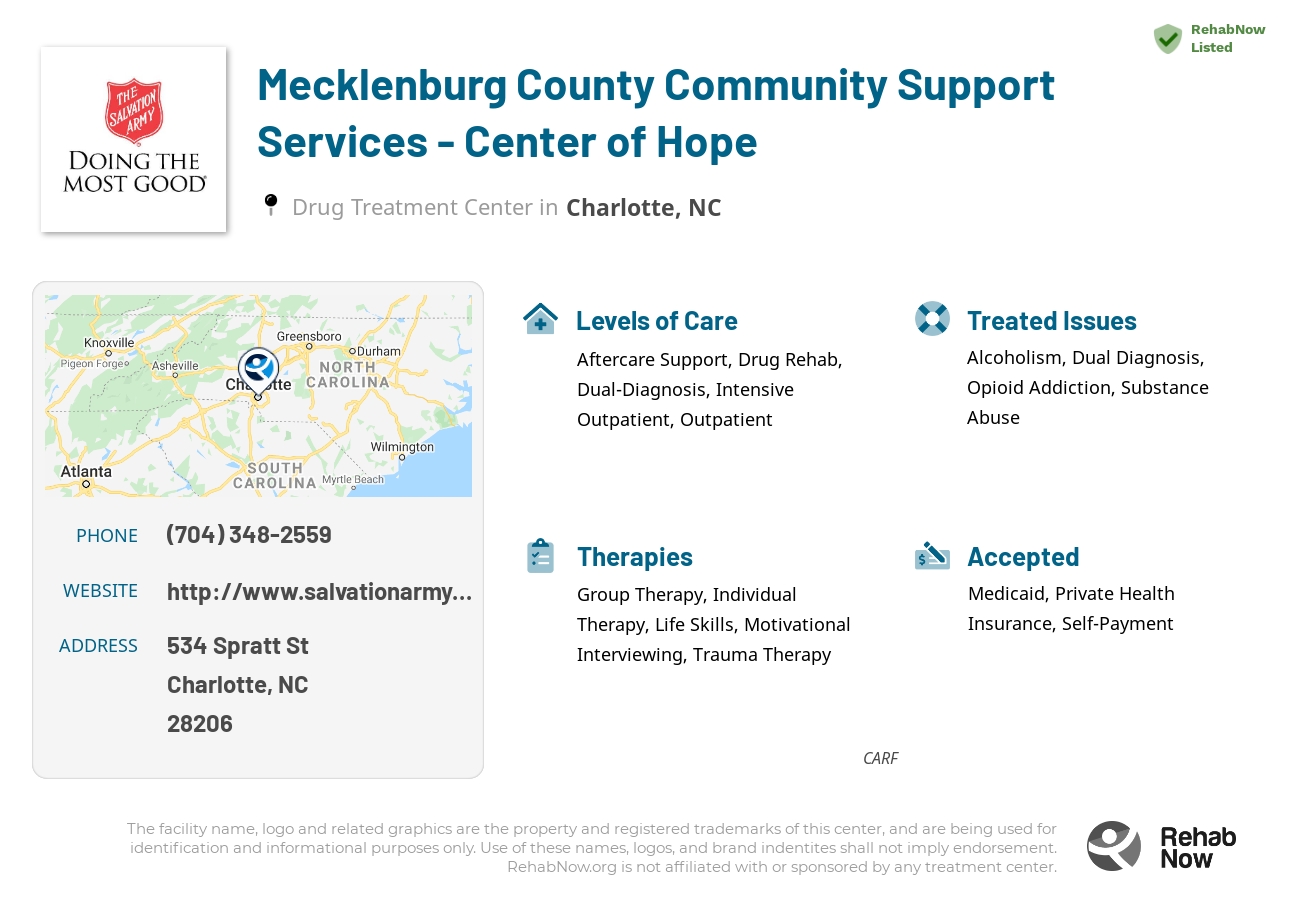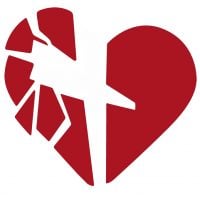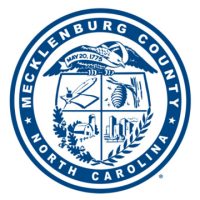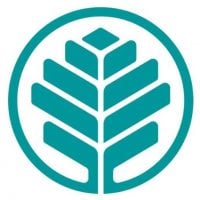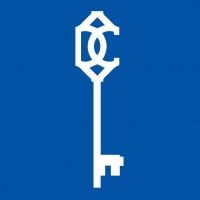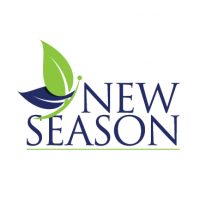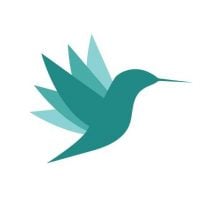Mecklenburg County Community Support Services - Center of Hope
Drug Rehab Center in Charlotte, North Carolina
Mecklenburg County Community Support Services - Center of Hope in Charlotte, NC, is an addiction treatment facility offering a range of programs and treatments for alcoholism, opioid addiction, substance abuse, and dual diagnosis, with a focus on personalized care and adherence to rigorous standards of care.
About This North Carolina Facility
Located in Charlotte, North Carolina, Mecklenburg County Community Support Services - Center of Hope specializes in Substance Abuse Intensive Outpatient Treatment (SAIOP). This facility stands out for its use of a combination of Best Practice Models, including Motivational Interview, Cognitive Behavioral Therapy, and more, tailored to meet individual needs without discrimination.
- Utilizes a variety of Best Practice Models such as Motivational Interviewing and Cognitive Behavioral Therapy to ensure a comprehensive approach to recovery.
- Offers a wide range of services, from detoxification to inpatient rehabilitation, addressing the unique needs of each individual.
- Accredited by the Commission on Accreditation of Rehabilitation Facilities (CARF), ensuring adherence to high standards of care.
Mecklenburg County Community Support Services - Center of Hope is CARF accredited, highlighting its commitment to excellence in addiction treatment. The facility's diverse program offerings, including both intensive outpatient and inpatient levels of care, are designed to meet the varied needs of those seeking help for substance abuse and dual diagnosis.
The center addresses a wide spectrum of addictions, including alcoholism, opioid addiction, and drug addiction, using evidence-based treatment methods such as Cognitive Behavioral Therapy and Motivational Interviewing. Their approach encompasses a range of care levels, from detoxification services to intensive outpatient programs, tailored to support individuals through every step of their recovery journey.
Genders
Ages
Modality
Additional
Accreditations

CARF
The Commission on Accreditation of Rehabilitation Facilities (CARF) is a non-profit organization that specifically accredits rehab organizations. Founded in 1966, CARF's, mission is to help service providers like rehab facilities maintain high standards of care.
Conditions and Issues Treated
Recovering from any type of substance abuse is a long process, but it is one of the most worthwhile and life changing events any addicted person will ever go through. This is a combination of detoxing the body, rehabilitation, and recovery. There is also therapy, aftercare, and support during the entire process.
While substance abuse can take over a person’s life, it is something that can also be overcame by professionals at Mecklenburg County Community Support Services - Center of Hope in Charlotte, NC
With so many people struggling with opioid addiction, opioid addiction treatment is more critical than ever before. Patients often take opioids when they face a painful injury. When someone begins taking opioids such as Vicodin or oxycodone differently than how the medications were prescribed, this points to opioid addiction.
Stopping these types of medications abruptly is not safe. That is where opioid addiction treatment at Mecklenburg County Community Support Services - Center of Hope in Charlotte, NC comes in. Most opioid addiction treatment facilities start with detox and move to rehabilitation services while providing medical support during the process.
Getting over an opioid addiction takes time and determination, but with the right support and resources, those struggling with opioid addiction can recover and move forward with their lives.
An underlying cause often brings about addiction. Mental disorders can lie at the center, such as schizophrenia, bipolar disorder or anxiety disorder. As well as the cause of the addiction, a dual diagnosis by Mecklenburg County Community Support Services - Center of Hope helps to treat the addiction. This ensures that after treatment is complete, the patient will not fall back on old practices.
Levels of Care Offered at Mecklenburg County Community Support Services - Center of Hope
This center offers a variety of custom treatment tailored to individual recovery. Currently available are Aftercare Support, Detox, Drug Rehab, Dual-Diagnosis, Inpatient, Intensive Outpatient, Outpatient, with additional therapies available as listed below.
Detox is a drug rehab process that begins before the actual drug rehab treatment. It is used to remove any residual toxins left in your body (and brain) after using drugs, and it is used with the intent to help you or your loved one complete drug rehab.
If you are addicted to opiates like heroin, methadone, or prescription painkillers, you will detox with medication. This is because the withdrawal symptoms are often more intense and uncomfortable for an opiate addict than for someone who has abused or is dependent on other drugs, like cocaine.
Inpatient rehab programs like what’s offered at Mecklenburg County Community Support Services - Center of Hope in Charlotte, NC are ideal for covering all the bases that surround one’s addiction. It’s considered the most comprehensive approach to care for people afflicted with addiction. Patients live in a facility where they have access to therapy and medical care 24/7.
An intensive outpatient program is a good option for someone in North Carolina with a milder or less severe addiction. An IOP may involve daily meetings at a treatment facility, along with personal counseling and peer meetings. Some IOP programs offer half-day treatment, while others offer full-day programs. Mecklenburg County Community Support Services - Center of Hope‘s IOP is customized per individual.
Outpatient treatment is treatment that occurs when a patient is not checked into a rehab facility. The patient may show up for therapy sessions, go through detox and engage in other therapies to help them recover. However, they will do so while they live at home in North Carolina.
Outpatient therapy provided by Mecklenburg County Community Support Services - Center of Hope is usually recommended as a follow up to inpatient therapy. It helps patients adapt to their normal lives after treatment. In some cases, it can also be an alternative to inpatient treatment. People may choose this route if they are unable to leave their jobs, children or if they don’t have the money for inpatient treatment. However, inpatient treatment is the best way to recover from addiction.
Therapies & Programs
Individual professional counseling or individual therapy refers to the one-on-one interaction between a patient and his or her counselor. Individual therapy allows for more privacy, one that group interactions can’t provide. Therefore, it becomes easier for a person to unload and become more open to his or her counselor.
Another benefit of individual therapy at Mecklenburg County Community Support Services - Center of Hope in Charlotte, NC is that all sessions aim to speed up a single person’s progress. It makes it easier for the counselor and the patient to deal with the central issues, which are likely the culprits of substance addiction.
Once the roots of the problems are addressed, it becomes less challenging for a recovering patient to maintain sobriety and brush off temptations.
Families are not always as supportive as they could be, but by opting for family therapy, many recovering addicts are able to understand their addiction and get the support they need to get sober. These therapy sessions at Mecklenburg County Community Support Services - Center of Hope in Charlotte, NC involve all members of the family who play a role in the recovering person’s daily life. They work together to overcome past issues, avoid triggers, and remain strong and supportive of each other.
In group therapy, the patient undergoes sessions with other patients dealing with similar problems under the guidance of a trained counselor. The members of the group interact with each other and talk freely about their issues. The recovery of members of the group from the problems that they face gives the patients confidence that they can also overcome their addiction.
Group therapy at Mecklenburg County Community Support Services - Center of Hope reduces the feeling of loneliness and improves the coping skills of the patients. Group therapy provides patients with continuous feedback from other members. The group dynamics ensure that members start having some structure and routine in their lives.
Cognitive behavioral therapy (CBT) is a way of addressing concerns through talking. Talking through issues can identify sources of discomfort or unhealthy thoughts. CBT is a healthy way Mecklenburg County Community Support Services - Center of Hope addresses some behaviors which may be bringing unintended consequences in a persons life.
Nutrition therapy involves providing healthy diet and improving the eating habits of the patient. Expert dieticians provide individualized meal plan, that addresses the specific nutritional deficiencies. Nutrition therapy also teaches the associated life skills such as cooking healthy food and grocery shopping. It helps to overcome the food cravings that are seen in certain addictions.
NRT, also known as nicotine replacement therapy, allows someone to get the effects of nicotine without chewing or smoking. It is often done with a patch, allowing those who want to quit relying on nicotine to better manage their cravings. As the cravings get easier to manage, the doses of nicotine get reduced until nicotine is no longer needed.
Patient Experience
Creative Arts
In creative art therapy, the therapist encourages the patients to express themselves through activities like sketching, painting, sculpting, coloring, collaging etc. The therapy can be administered at an individual or a group level. Creative art helps the patients to express their emotions consciously or unconsciously.
- Patients are often able to communicate effectively, through creative art, what they cannot verbally.
- The therapy helps patients to handle stress and anxiety in a better manner.
- They become more self-aware and develop higher self-esteem.
- The therapy improves their communication skills and ability to process past traumatic events.
- Creative art helps the patients to improve their physical, mental and emotional well-being.
Experiential Therapy at Mecklenburg County Community Support Services - Center of Hope
Experiential therapy can involve acting, props, arts and crafts, animal care or other tools. It can help revisit and heal from past traumas. Trust between the therapist at Mecklenburg County Community Support Services - Center of Hope and individual is important for success and grown over the stay.
Payment Options Accepted
For specific insurance or payment methods please contact us.
Is your insurance accepted?
Ask an expert, call (888) 674-0062
Mecklenburg County Community Support Services Associated Centers
Discover treatment facilities under the same provider.
- Mecklenburg County Community Support Services - Jail North in Charlotte, NC
- Mecklenburg County Community Support Services - Jail Central in Charlotte, NC
- Mecklenburg County Community Support Services - Men's Shelter in Charlotte, NC
Learn More About Mecklenburg County Community Support Services Centers
Additional Details
Specifics, location, and helpful extra information.
Charlotte, North Carolina 28206 Phone Number(704) 348-2559 Meta DetailsUpdated April 15, 2024
Staff Verified
Patient Reviews
There are no reviews yet. Be the first one to write one.
Charlotte, North Carolina Addiction Information
North Carolina ranks 29th in the nation for overall substance abuse. Many of the drugs abused in the state are illicit, and many of these are opioids. Prescription opioids are readily available due to the high rates of medical workers prescribing them. The number of prescriptions has increased tenfold since the 1980's. Opioid overdoses are the most common type of death in North Carolina.
4.3% of Charlotte residents aged 12 and older reported using illicit drugs. There are over 60,000 people addicted to drugs in Charlotte, North Carolina. This harms the community and contributes to crime and other social problems. Medication-assisted treatment is often used in conjunction with other forms of treatment, such as therapy, and can be very successful in helping someone overcome addiction.
Treatment in Nearby Cities
- Sanford, NC (94.9 mi.)
- Supply, NC (168.9 mi.)
- Camp Lejeune, NC (202.3 mi.)
- Mount Olive, NC (156.6 mi.)
- Wanchese, NC (295.5 mi.)
Centers near Mecklenburg County Community Support Services - Center of Hope
The facility name, logo and brand are the property and registered trademarks of Mecklenburg County Community Support Services - Center of Hope, and are being used for identification and informational purposes only. Use of these names, logos and brands shall not imply endorsement. RehabNow.org is not affiliated with or sponsored by Mecklenburg County Community Support Services - Center of Hope.
